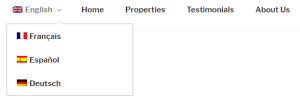f you as a company operate internationally and do this digitally through your website / platform, you can benefit enormously from the use of geolocation.
This is to offer your visitors a website in their own language.
What is Geolocation?
According to Wikipedia, geolocation entails the following;
Geolocation is the identification or estimation of the real-world geographic location of an object, such as a radar source, mobile phone, or Internet-connected computer terminal.
In its simplest form geolocation, involves the generation of a set of geographic coordinates and is closely related to the use of positioning systems, but its usefulness is enhanced by the use of these coordinates to determine a meaningful location, such as a street address.
A very extensive description to say that geolocation gives insight into the geographical location from which you visit a medium. In addition, the description of Wikipedia is one that also paints a bit black in terms of privacy.
Possibilities Geolocation
It is possible to gain insight into geolocation among others;
- IP address
- Country
- City and Region
- Latitude
- Postal Code
- ISP (Internet Service Provider)
- Time zone
- Speed of your internet
- Area code
- Height compared to sea level
In short, there is a huge amount of geolocation that you can use to create a good split (segments) of your visitors and then to link actions to them.
However, the image that Wikipedia paints goes a bit far as this will scare a lot of people of the possibilities of geolocation.
Do you, as a user, have to be afraid of geolocation?

You might be a bit scared following the Wikipedia description. But is that necessary?
There are very few parties that use all these aspects in such detail. In most cases it concerns two primary issues when it comes to geolocation; Country and city / region.
The reason behind this is that one of the main applications for Geolocation is offering the correct language for the user in question. You do not want to offer someone in England your Dutch content, but rather (if you have the English content).
In addition, a user is always indicated whether the location will be used. You have, therefore, in your own hands whether or not you allow this. If in doubt, cancel or reject the request.
In short; No for geolocation you should not be afraid, it can help you to get a better experience on the internet.
Why geolocation?
Geolocation has a huge advantage compared to other methods for guiding to the right language.
Let us first make a sketch of some of those other possibilities;
Based on the language of the browser
![]()
It is not a strange idea to link an action based on the language of the browser language.
However, there are plenty of practical examples to mention in which it is the case that the user uses a foreign language browser for a reasoned reason, but wants to see your content in a certain language.
You encounter these users with such a method.
In addition, such a redirect is often without a confirmation prompt or the like.
As a result, the user also has no real possibility of refusing this, other than changing the language of the browser.
By using a language selector

Having a language selector on your website / platform is highly recommended if you offer multilingual content and good translations (machine translated as a Google Translate is simply less strong).
But what is very important is to realize that if someone does not know a language when they enter a website, the chances that they will search for a language selector are already very small, no matter how well you have arranged them.
If they are not offered direct action to switch to a language that would be better suited for them, the chance of leaving your website / platform is considerable. Something you would see in your bounce percentage in Google Analytics, for example.
For the right order to continue offering a language selector is 100% recommended. As the simplest example, grab someone who clicked too fast and still wants to go to the other language. Or someone who is on a public PC but has a different language preference. For example, there are still quite a few other scenarios.
What should you note when using Geolocation?
If you are going to work with geolocation, there are a number of things that you have to take into account.
On a technical level, you have to see if there is nothing that can prevent your implementation of geolocation or make it even worse. An example of this is caching.
Practical example – caching
To give an example; Imagine you have set up your website / platform with a good cache solution and you get an English visitor, who gets to see an English website. The cache then does its work neatly and creates a cache object from the English website. Then you get a German visitor, and the caching serves the English content to this visitor.
The German visitor then will think something like “verdammt”.
That is of course not what you want, you want the German visitor to get the content you have in German. To be able to actively realize that with caching your website will need to be set up with the necessary code (AJAX in this case) which real-time checks the geolocation of the German visitor (or whichever) and retrieves the content based on that.
Practical example – amount of request / costs
Depending on how you implement geolocation, you may have a solution where you use a Google API or another API. In such cases you may have to deal with costs that apply to the requests you make through the API.
So far it is not all that exciting, but what is important is that you do not have to make a new request with every pageview. That is not entirely efficient. You could then look at a solution so that you take this into the session or the like.
This way you can save on resources, both technical resources and financial resources.
Practical example – No API
The use of an API is NOT required BUT if you work without such a solution you work with certain files that are periodically updated. The essential difference is that these files can not be up-to-date so that you get information that is incorrect.
In short, for the implementation of a good geolocation based action, the necessary issues will have to be taken into account in advance. This is to ensure that you can use the possibilities as efficiently as possible.
Are you already using geolocation to target your visitor in the right way to guide the content that is best for them? If not, I hope that this item has at least made you think about it!


